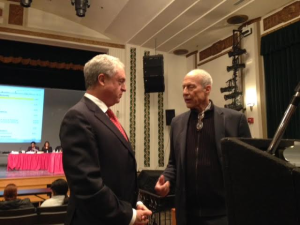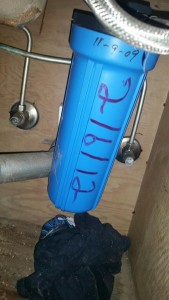
First he won’t let the press into a public meeting–or take pictures close to him. Then he threatens not to talk about the water crisis. Finally, he admits the problem is worse than anyone thought but he can’t find a lot of records showing how the district handled contamination that may be 12 years old.
An often rattled Newark schools chief Wednesday night told an angry audience at a city school board meeting that top officials had been aware of a lead problem in school water supplies for more than a decade, since 2004–and that contamination levels averaged higher in the last three years than they did in the last year: 12 percent of samples taken, as opposed to 10 percent. But state-appointed superintendent Christopher Cerf insisted it was “impossible” to track the scope of the problem.

Often stammering and frequently clearing his throat as he tried to speak, Cerf also tried to depict the crisis as one that went far beyond Newark and may, in fact, be a problem in all public schools in New Jersey.
“In my judgment,” said Cerf, “we have collectively surfaced here and elsewhere a gap in identification and treatment of water.”
His rambling attempt to explain the issue was often confused and contradictory and he was clearly shaken by persistent heckling from an obviously concerned audience. For example, he said the first thing he did was alert the public as soon as he found out there were high levels of lead in 30 schools enrolling 17,000 children. That brought gasps of disbelief.
Because he also said he waited several days before telling anyone in the affected schools about the problem and conceded principals were surprised when they came to school last Wednesday and found palettes of emergency water supplies stacked outside their buildings. They were delivered overnight from the state’s Office of Emergency Management at his request, he said.

Cerf insisted that dates written on water filters were not indications of when they had to be changed–but he never said what the dates did, in fact, signify. The Newark Teachers Union (NTU) published photographs of water filters that appeared to bear dates indicating they had expired and should have been replaced.
Cerf called that “the good news”–without ever explaining what he meant–but the bad news, he said, is that records of how meticulously the water supplies in schools were inspected and repaired and cleaned did not exist.
He said it was “literally impossible” to track down work orders that showed the district dealt with the longstanding problem–which, he said, became aware of the problem in 2004.
Cerf blamed the contamination on water passing through lead pipes or copper pipes that used lead solder for joining, but he never linked any of those general explanations to actual schools.
The schools chief also said the schools–not the city or the state health and environmental protection departments–would begin testing children for lead poisoning as early as Thursday. He said they would start at early childhood centers. Just a day earlier, city officials said they were working with the state to have the children tested.
Groans–as well as angry shouts–came from the audience when Cerf said records were missing because the district had changed testing contractors.
At one point, Cerf threatened to refuse to tell what eh knew because of the heckling. “I can give you the facts or you can scream at me,” he said, his face flushing.
Board member Antoinette Baskerville-Richardson said his failure to find the records needed for “an historical analysis” was “not acceptable.”
“I simply cannot understand what the man was talking about,” said Daryn Martin, one of a number of parents who held a press conference before the board meeting. “He is telling us all sort of things but he is not providing the documentation.”
Donna Jackson, another parent leader, said they were building an organization that had a variety of demands–starting with Cerf’s resignation. But she said the problem went beyond lead in the schools.
“The city water is contaminated,” she said.
The meeting at Arts High School began in an atmosphere of confusion. Reporters from various news outlets–including this one–had attended the news conferences but then were banned from entering the school for the regularly scheduled public school board meeting.
“No press,” said a security guard at the door.
After other district officials agreed to let the press in, they insisted television crews could not bring in their cameras. The media outlets left.
Michael Aron, the veteran Trenton correspondent for NJTV, said he was told by Cerf that the schools chief had “nothing to do with the order” to exclude news cameras but that it came from the school board.
If that were true, it would have been an extraordinary piece of news–because the school board has no power to do anything. Because of the state takeover law, all the governance powers of the school board are vested in the state-appointed superintendent–Cerf. If the television crews were banned, he had to be the one who banned them.
After nearly a half hour of wrangling about press accessibility to a public meeting, the crews were allowed in–but most of them already had left the site. Two–including NJTV–were required to stay in the back of the hall. During the meeting, photographers were not allowed to get close to the stage to take pictures of Cerf and the board members–something that has never happened at a board meeting.
Confused as he was, Christopher Cerf apparently knew one thing about the water crisis–how to keep media coverage down to a minimum.
[…] Compare NJ Spotlight coverage with that of Bob Braun. […]